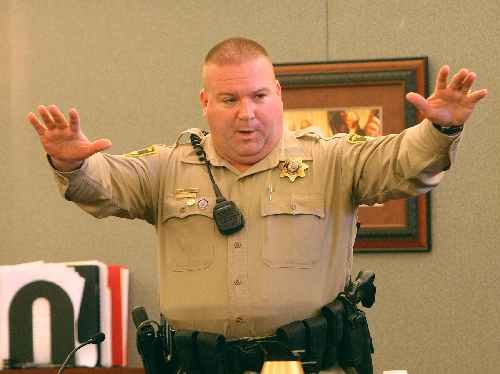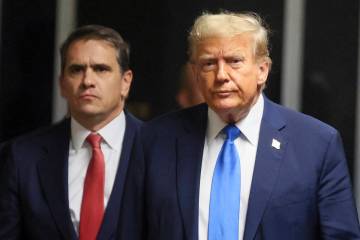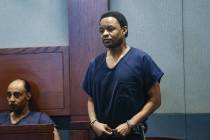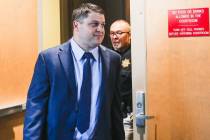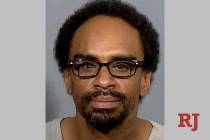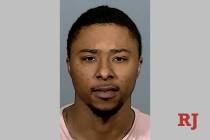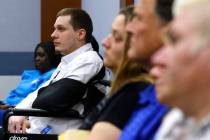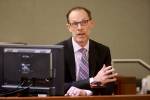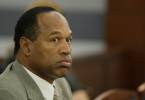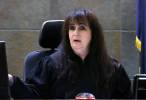Coroner’s inquest reforms discussed
Clark County commissioners on Tuesday moved toward restricting coroner's inquest attorneys who act as ombudsmen for the families of those killed by police.
Neither they nor their firms could be involved in lawsuits impugning how police used force against a suspect, either five years before or five years after an inquest hearing, according to a proposed rule that most commissioners supported.
Sheriff Doug Gillespie suggested the rule. He also recommended that the ombudsmen be paid, rather than work for free, to ensure the county gets qualified applicants.
Commissioners were putting the final touches on sweeping changes they approved two weeks ago to the four-decade-old inquest system that probes police killings, most of which are shootings.
The reforms also would allow police officers to have a union attorney at hearings, eliminate jury verdicts and disclose more information publicly before inquests.
Commissioners first approved the overhaul by a 4-2 vote on Dec. 7 and will make the final vote on Jan. 4, expected to be a formality. They took no formal action Tuesday.
"I think we're just about there," Commissioner Rory Reid said. "Just a few details left. We've made fundamental changes."
Reid, whose last commission meeting is today, said it doesn't bother him that he will leave office before the new code is finalized. The first vote was the important one, said Reid, who pushed to give families more representation.
All inquests have been postponed until the pending changes are ratified, Coroner Michael Murphy said.
The first case that will go to inquest under the new system probably will be the one involving Eduardo Lopez-Hernandez, who died Aug. 25 after Nevada Highway Patrol officers stunned him with electronic devices, Murphy said. The case was originally set to be heard Dec. 16.
Under the current system, the prosecutor, judge and jury are the only ones who ask questions in open court. Most everyone agrees that letting families have attorneys at hearings is pivotal.
The new rules would replace juries with inquest panels that would make findings of fact instead of fault.
The changes also call for two pre-inquest meetings. Investigative files would be shared with officers and the families of the person killed.
Both sides would determine the scope of questioning for an inquest, with the aim of pinpointing what happened during a fatal shooting.
And officers would be allowed a union attorney at inquests.
Still, police union leaders oppose ombudsmen, saying they will make the process adversarial. They have stated they will advise officers involved in shootings not to testify.
Chris Collins, head of the Las Vegas Police Protective Association, couldn't be reached for comment Tuesday.
Some county officials recommend putting a dozen or so ombudsmen in a rotation.
These lawyers would receive a maximum of $5,000 for an inquest. Gillespie suggested having a board interview the candidates, and he argued that a law enforcement official must be on this panel.
It is paramount that the right people act as ombudsmen, he said. Otherwise, "it will taint the process."
Commissioner Steve Sisolak backs all the changes except creating ombudsmen.
He questioned whether family members of dead suspects could sue an ombudsman -- and the county -- if they're displeased with the lawyer's performance.
County counsel Mary-Anne Miller replied that the inquests will be fact-finding sessions, giving the families no basis for litigation.
Lisa Mayo-DeRiso, an inquest critic, acted as spokeswoman for the family of Erik Scott, who was fatally shot by police outside a Costco. A jury found the officers' actions justified.
Mayo-DeRiso said she was initially concerned with some of the code's wording. One section stated that the judge "may" appoint an ombudsman, opening the door for a judge or prosecutor to deny counsel to a family, she said.
But commissioners agreed to change the "may" to "shall," she said, adding that this one word makes a big difference.
The commission now must act promptly so that inquest cases don't hang in limbo, she said.
"It needs to be a top priority to get this adopted and get the process under way," Mayo-DeRiso said.
Contact reporter Scott Wyland at swyland@reviewjournal.com or 702-455-4519.



